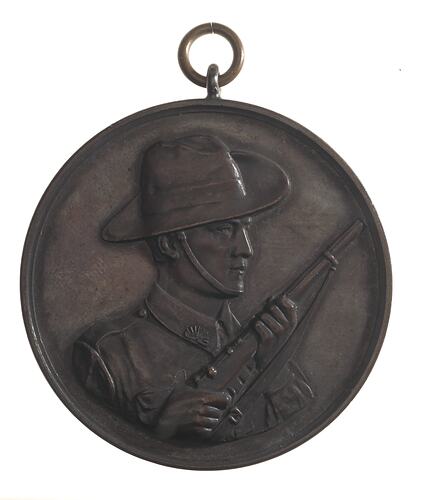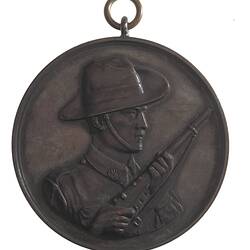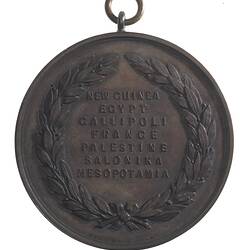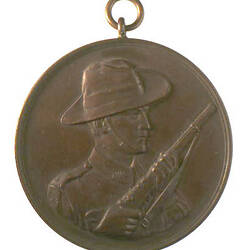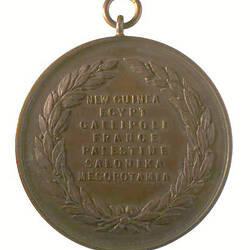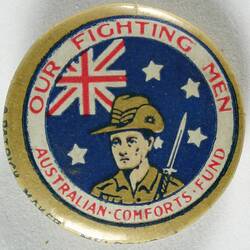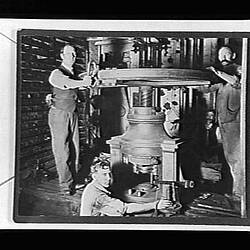Summary
Medal issued by the South Australian division of the Australian Comforts Fund. Comforts Funds sent care parcels to Australians serving overseas, including letters, newspapers and periodicals. Early in World War I local women's groups in Australia began working to provide provide tobacco, cakes, puddings, condensed milk, sugar, biscuits' newspapers and other 'luxury' items to supplement the Australian soldier's army rations. These fundraising bodies were amalgamated in 1916 to form a national body which undertook to provide 'comforts' to all Australians abroad, the Australian Comforts Fund. The ACF grew into an enormous fundraising, collecting, sorting and distribution organisation that rivalled the Red Cross. Although men took some executive positions on national and state committees, the bulk of the administrative and manual work fell on a huge 'army' of unpaid women. Some of the work took place on the battlefield, where 12 million mugs of coffee and tea were provided during World War I. The ACF was dissolved at the end of the War, but had proved such a success as a link between home and the battlefield that it was revived in 1940.
Physical Description
Obverse has a bust of a soldier. Reverse has an inscription framed by a wreath.
Obverse Description
Bust of Australian soldier right wearing hat and holding rifle
Reverse Description
Within wreath, NEW GUINEA / EGYPT / GALLIPOLI / FRANCE / PALESTINE / SALONIKA / MESOPOTAMIA; in small letters below wreath, STOKES & SONS
Edge Description
AUSTRALIAN COMFORT FUND SA DIVISION
Significance
Early in World War I local women's groups in Australia began working to provide provide tobacco, cakes, puddings, condensed milk, sugar, biscuits' newspapers and other 'luxury' items to supplement the Australian soldier's army rations. These fund-raising bodies were amalgamated in 1916 to form a national body which undertook to provide 'comforts' to all Australians abroad, the Australian Comforts Fund. The ACF grew into an enormous fundraising, collecting, sorting and distribution organisation that rivalled the Red Cross. Although men took some executive positions on national and state committees, the bulk of the administrative and manual work fell on a huge 'army' of unpaid women. Some of the work took place on the battlefield, where 12 million such mugs of coffee and tea during World War I. The ACF was dissolved at the end of the War, but had proved such a success as a link between home and the battlefield that it was revived in 1940.
More Information
-
Collecting Areas
-
Acquisition Information
Transfer from National Gallery of Victoria (NGV), 15 Mar 1976
-
Date Issued
circa 1919 AD
-
Issued By
Australian Comfort Fund, South Australian Division, Adelaide, Greater Adelaide, South Australia, Australia, circa 1919
-
Mint
-
Commissioned By
South Australian Division, Australian Comforts Fund (ACF), South Australia, Australia, 1918-1920
-
Inscriptions
AUSTRALIAN COMFORT FUND SA DIVISION NEW GUINEA EGYPT GALLIPOLI FRANCE PALESTINE SALONIKA MESOPOTAMIA STOKES & SONS
-
Series
-
Material
Bronze
-
Axis
12
-
Classification
-
Category
-
Discipline
-
Type of item
-
Overall Dimensions
52 mm (Outside Diameter), 66.86 (Weight)
-
Dimensions
50 mm (Width), 61 mm (Height)
-
Shape
Round with loop
-
References
References: Picture Australia website [Link 1] State Library of Victoria website World War I 1914-1918: Women and the War, [Link 2] Anzac Day website [Link 3] -D. Tout-Smith 27/11/2003. Car. ZN/1
-
Keywords
Wars & Conflicts, World War I Fundraising, World War I, 1914-1918, Soldiers' Comforts
